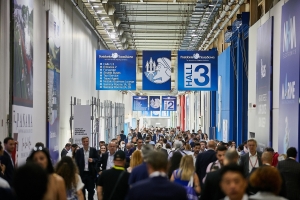


(Posted on 12/06/22)
More than 40 marine fuel suppliers from around the world have gathered at this year’s Posidonia during a critical juncture for the US$300billion bunkering market, due to the double whammy of the geopolitical crisis and the uncertainty surrounding the regulatory framework pertaining to the decarbonisation of the shipping industry.
Alexander Prokopakis, CEO of probunkers, an Athens-based independent LNG bunker supplier said: “Bunkering has been hit from the trickledown effect of the sanctions against Russia, and this of course has had a serious impact on prices. Pre-war, the global prices were around US$750-US$850 per ton, and now we are looking at prices above US$1,000.
“Since we are in unchartered territory, no one can really predict where the price will end up. Hopefully for now we will stay at this level, if not, the effect of exceeding the US$1,200 mark will bring about a detrimental ripple effect across the entire shipping industry.”
His views are shared by another major bunkering player with a strong Greek presence, Baluco. Commercial Manager John Stavropoulos said: “The price of oil has doubled, and this has created an extra cost for ship operators because oil and lubricants account for almost 60-70% of the total vessel operational expenses. So, the total cost per journey has skyrocketed and that’s not just it. Credit lines for operators have also been impacted as they have to pay double the amount they used to, in order to receive the same volume as they did before the crisis.
They both said that demand for bunkering fuel has not been impacted and has in fact increased at ports outside Russia, as the points of supply have been reduced.
In addition to the impact on fuel prices, shipping companies and their customers are facing increased costs due to more expensive lubricants. Major international lubes maker and supplier Gulf Oil Marine, says that the price increase varies depending on the market.
“We have already seen an increase of between 20 and 30 cents per litre, which is roughly a 20% spike, but I am afraid that we still haven’t seen the end of this pressure on prices. We forecast a further increase of 10-20% by the end of the year, and we are doing our best to mitigate the increases,” said David Price, Chief Executive Officer.
The war in Ukraine has caused supply issues in the lubes sector as well. According to Gregory Papathanassiou, Director Gulf Oil Marine Hellas, supply has been reduced because of the sanctions on Russia and insists that hard work around the clock is the remedy to ensure and safeguard supply security. “We need to ensure that lubricants are available whenever and wherever our customers need it. It causes a lot of hard work and tension. Of course, there remain many issues, but our aim is to ensure our customers don’t see or face these issues for themselves,” he said.
He added that Gulf Oil Marine has recently invested in a blending plant and R&D facility in Singapore to help it stay ahead of the curve, but acknowledges that getting a new lube to market from scratch requires a huge investment and a lot of time as the process for testing and approvals is long.
Nellos Economopoulos, General Manager Valecrest Marine Lubricants, seems to agree: “In order to be able to be ready for the future, we first need to know what the future will be. Once the number one option for the fuel of the future is agreed upon, we then need to start preparing for it, in order to develop the suitable lubes solutions. We need to look at all the options. It would take nearly up to two years to be able to do the research that is required, the testing and the infrastructure to go to market with new lubricants for the new fuel products.”
Leading vessel performance platform Smart Ship Hub says the industry should expect a breakthrough year... Read more
The Nordic countries are taking an important step towards decarbonising maritime transport with the... Read more
Germany’s Steelpaint has appointed ADD Marine as its representative for Greece and Cyprus, strengthening... Read more
Rio Tinto’s first Pilbara-made iron ore rail car has rolled off the production line in Karratha... Read more
Precision meets progress at Phu My Port, Vietnam. The LPS 550 has been deployed to handle bulk commodities... Read more
bound4blue, a global leader in wind propulsion systems, has expanded its industrial footprint in Asia... Read more
As the industry explores multiple decarbonisation pathways, methanol is gaining attention as a practical... Read more
Technology group Wärtsilä will supply an integrated hybrid propulsion system for a bulk carrier... Read more
Superior Industries, Inc., a US-based manufacturer and global supplier of bulk material processing and... Read more
ESL Shipping has taken a significant step forward in digitalisation by deploying a new multichannel... Read more